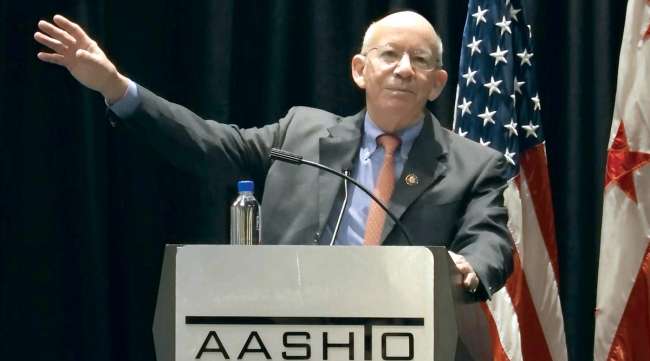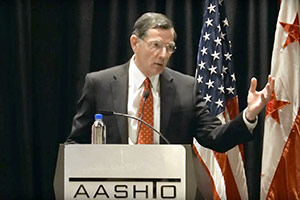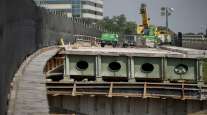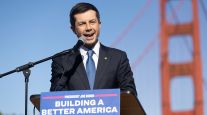Senior Reporter
House Transportation Leader DeFazio Offers Infrastructure Legislation Roadmap

WASHINGTON — Facing pressure during a high-profile conference with leaders from most state departments of transportation, the top transportation policymaker in the U.S. House said lawmakers are considering a two-pronged approach to getting infrastructure policy moving.
Speaking to reporters at a conference hosted by the American Association of State Highway and Transportation Officials on Feb. 27, Rep. Peter DeFazio (D-Ore.) explained that his committee would most likely tackle infrastructure policy via two paths. The first would be to reauthorize the 2015 FAST Act highway law prior to its expiration in the fall of 2020. The second would be crafting and advancing a long-term infrastructure funding bill separate from the FAST Act’s reauthorization.
“As I understand it, and I’m not in charge, there’s an expectation there’ll be two bills,” said DeFazio, chairman of the Transportation and Infrastructure panel. “There is some inclination, on the part of my leadership, to move an infrastructure package much earlier this year, which hopefully would include substantial funding for surface transportation, out of the Ways and Means Committee.”
He added, “Probably we will go mostly with existing authorization in policy but look at some minor changes at that point.”

Sen. John Barrasso (R-Wyo.) (aashto via Youtube)
Addressing the state officials, DeFazio emphasized that the federal government had “not been a good partner for many years now. … It’s time for the federal government to step up, step back in and become a better partner.”
When asked about the possibility of raising the federal fuel tax, DeFazio deferred the question to the leadership of the tax-writing Ways and Means panel, which has jurisdiction over the dwindling Highway Trust Fund that is supported by the tax.
The U.S. Department of Transportation helps states with revenue the fund collects from the diesel and gas tax. Many stakeholders are calling on Congress to increase federal fuel taxes.
Sen. John Barrasso (R-Wyo.), DeFazio’s Senate counterpart with oversight of the Environment and Public Works Committee, was silent about a timeline for considering one or two comprehensive surface transportation or infrastructure policy measures. The senator also has not endorsed a primary source of sustainable funding for boosting the trust fund, but reaffirmed for AASHTO members his panel’s drive for approving a major bill.
“Congress needs to commit to funding the needed infrastructure highway projects so that we can keep pace with demand,” Barrasso said. “The time has come to make the significant investments in our roads and bridges and to keep the Highway Trust Fund solvent.”
The ranking members on the congressional panels, Missouri Republican Sam Graves in the House and Delaware Democrat Tom Carper in the Senate, expressed their support for advancing big-picture bills on infrastructure policy.
For Graves, shifting from fuel taxes to charging motorists for miles driven seems viable, and intends to promote the VMT fee in upcoming negotiations. Carper has promoted a fuel tax increase and he reminded the audience at the conference that President Donald Trump last year privately endorsed increasing the 24.4-cents-per-gallon diesel tax, and the 18.4-cents-per-gallon gas tax. Those taxes have not been raised since the Clinton administration.
The White House has yet to present legislative principles on infrastructure policy during this Congress, but Trump during a Feb. 25 meeting with governors addressed the issue.
“On infrastructure, I would like you to call your senators and call your congressmen and women and get it done, because I’m ready. I want to sign. I am totally ready,” the president said.
Meanwhile, AASHTO, the U.S. Chamber of Commerce, the American Society of Civil Engineers and the American Road and Transportation Builders Association are among myriad groups insisting Congress advance long-term infrastructure funding legislation this year. Most groups endorse a fuel tax increase.
“Congress has about seven or eight months to try to get some of their key pieces of legislation done. And I think getting something done on transportation is a priority for both parties — Democrats and Republicans — in the House of Representatives and the Senate. And I think President Trump’s administration wants to get something done on infrastructure, as well,” said AASHTO executive director Jim Tymon.
To remain operational, analysts have determined the Highway Trust Fund will require supplemental funding sometime in 2021. The revenue generated from the federal gas and diesel tax has demonstrated to be insufficient for meeting the fund’s obligations nationwide. Responding primarily to federal inaction, more than two dozen states have increased their fuel taxes in recent years.





